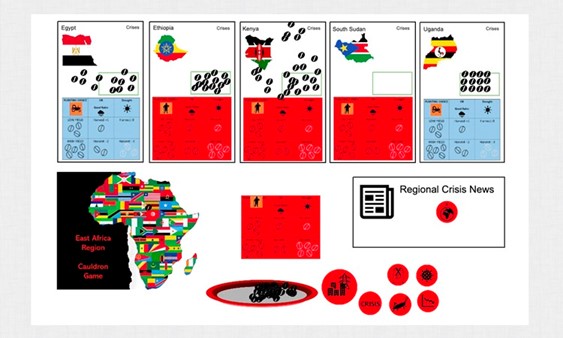The Cauldron Game
Countries / Regions
Senegal; Kenya; Tanzania; UK
Partners
University of Oxford, Met Office, AfClix, Red Cross Red Crescent Climate Centre
Funders
NERC
Project Team
Prof Ros Cornforth, Dr Hannah Young, Emily Boyd, Myles Allen, Friederike Otto, Rachel James, Richard Jones, Pablo Suarez
Background
The CAULDRON (Climate Attribution Under Loss & Damage: Risking, Observing, Negotiating) Game is a game designed by the University of Reading (AfClix, Walker Institute) and the Environmental Change Institute, University of Oxford, in partnership with the Red Cross Climate Centre as part of the ACE-Africa (Attributing impacts of external climate drivers on extreme weather in Africa) project.
The CAULDRON game aims to foster cross-sector discussion around the science of extreme weather event attribution and its potential for use in policy-making, especially in UNFCCC Loss and Damage Work Programme negotiations. The engaging and fast-paced game encourages players to understand the role of climate change and extreme events against a backdrop of changing risk. Strong emotions arise as players find themselves changing roles and pressured to make fast decisions whilst working together to address challenges such as drought – hence the name “the CAULDRON”.
As farmers in either a developed country or in a developing country, players make planting decisions using either a normal or loaded ‘climate’ dice to determine the rainfall. Moving into the shoes of climate scientists, players next find themselves having to address questions about whether climate change has altered the risk of drought in their country and how many of the droughts being experienced might be attributable to climate change.
Players can roll a ‘climate model’ dice to understand the statistics. But is the climate model reliable? Finally, players assume the role of policy makers and have to negotiate a climate change treaty for their region. Developed countries are historically responsible for greenhouse gas emissions. Does that make them responsible for loss and damage in developing countries? How strong does the evidence have to be? Do they use their resources to help the countries which have suffered damages?
A plausible agreement between developed and developing countries needs to be written and signed by all participants at the end of the game. All the resources needed to run the game yourself are available for download from this page (see the README document for a description of the files). If you do use the game we’d love to hear about your experiences so please get in touch!
Our Impact
In 2020, a huge amount of effort and ingenuity has gone into creating COVID-safe, online versions of previously in-person experiences. At the Walker Institute, we’re embracing technology to make sure that vital training can continue, despite the current restrictions.
As part of this process, we have developed a fully-online version of the CAULDRON game; an interactive training experience that teaches players about the pressures and challenges faced by farmers and other stakeholders when making decisions around food systems.
After extensive testing, this new, online version of the CAULDRON game had its first live session as part of the induction for the FoodBioSystems Doctoral Training Partnership (DTP). 30 PhD students from six universities took part in the session, assuming the roles of farmers, climate scientists and negotiators in different countries across the African continent. Players had to make tough decisions on farming strategies, attempting to build up sufficient food stocks while always being at the mercy of the weather, possible climate change impacts and other production shocks, both natural and economic. They then had to form a negotiated agreement, balancing regional needs with their own national interests.
The online version of the game was a great success with some heated gameplay and very lively negotiations! “Thank you so much for working with us today,” said Lisa Methven, Director of the FoodBioSystems DTP, “our students loved it as I am sure you could see.”
While we sincerely hope that in-person training sessions will become increasingly possible in the near future, the benefits of online training are certainly not limited to the times of COVID. Online experiences allow participants to join sessions from anywhere in the world and we look forward to developing a number of new online training opportunities through the Walker Academy in 2021 and beyond.


